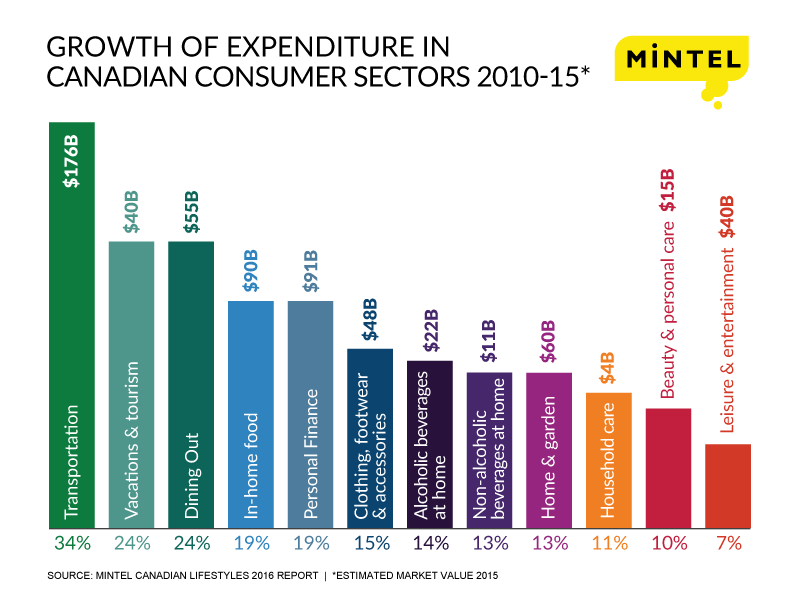Canadians adopt conservative spending mentality: Rising cost of food drives consumers to forego spending in pleasure-related categories
The higher cost of goods is weighing heavily on the minds of Canadians, leading consumers to practice conservative spending. New research from Mintel reveals that food-related categories such as groceries and foodservice consumed the majority of Canadians’ dollars in 2015 due to a focus on essentials spending, as well as high inflation. As a result, consumers are resisting the urge to spend their remaining discretionary dollars on pleasure-related categories such as travel, leisure and entertainment. Prioritizing debt reduction and saving for the future are top of mind for Canadians; however, treats are still valued as a way to balance responsibilities.
Some 83% of Canadians agree the annual increase in the cost of living is concerning, with three in five (58%) consumers citing the increased cost of living as the factor that has had the biggest impact on their financial situation over the past year. As such, nearly three in four (73%) consumers agree they have cut back on the things they do not really need.
In general, Canadians spent at similar levels across categories in 2015 compared to previous years*. By far, in-home food is the category Canadians are most likely to have spent more on (39%), resulting in a 3.7% increase in sales over 2014 to hit $90.4 billion (fuelled by inflation vs consumption growth). Conversely, consumers feel they are cutting back on alcoholic drinks out of the home with 38% reporting they are spending less, while 36% report spending less on dining out and 33% report spending less on leisure/entertainment categories. These cut-backs resulted in slow or steady growth across non-essential categories: alcoholic drinks out of the home and leisure/entertainment markets saw a mere 1% sales increase 2014-15 respectively, while the dining out market experienced steady growth of 4.1%, reaching $54.5 billion in 2015.
The weak Canadian Dollar is seen as a contributor to the higher overall costs of goods; however, it may work in favor of the travel economy as domestic travel is now seen as more appealing with the majority of Canadian vacationers travelling throughout the country (73%).
48% of Canadians feel the economy will be worse off in a year’s time
Along with a focus on conservative discretionary spending, the ability to become financially sound remains a top concern. In fact, two in five (37%) consumers list paying off debt as their biggest financial challenge right now, followed by one third (33%) who are focused on saving for retirement. Looking ahead to 2016, Canadians are not overly optimistic as nearly half (48%) feel the economy will be worse off in a year’s time.
“The flux of the Canadian economy is leaving consumers feeling wary, driving them to adopt a more conservative approach to spending in 2016 compared to previous years. The higher cost of basic necessities has led to a ‘spending in moderation’ mentality, with food related categories demanding the bulk of consumers’ dollars,” said Carol Wong-Li, Senior Analyst, Lifestyles and Leisure at Mintel. “Although the majority of Canadians perceive their current financial situation as stable, there is a greater prioritization of addressing current debt and saving for the future. Our research does show, however, that the quest for a balanced lifestyle remains, indicating that accessible options for leisure activities will be in greater demand, including domestic travel.”
The findings come as Mintel launches its flagship Canadian Lifestyles report, which tracks spending across all major consumer markets. Overall, Mintel research reveals that total consumer expenditure in Canada reached an estimated $1.124 trillion in 2015, representing an increase of 3.9% over 2014. This increase is tempered by cautious spending as just over one third (36%) of Canadians perceive their financial situation** to be ‘healthy’ and 37% see their financial situation as ‘okay’.
Highlights from the 2016 report include:
“FOMO” fuels vacation spending for Millennials
The trend of spending on experiences over material goods continues to play a major role in the growth of the vacations and tourism market, despite the weaker Canadian Dollar, with sales increasing 2.8% to reach $39.8 billion in 2015. Social media is a driving force for sharing the pursuit of exciting events and experiences with others. Similarly, “FOMO” (“fear of missing out”) is the Millennial generation’s version of “keeping up with the Joneses” and underpins their spending in this category. As young consumers see others participating in vacation activities, it drives their desire to follow suit, lest they miss out on the fun.
A night out feeds the need for balancing affordable indulgence and time saving
Dining out is one of the top categories in which Canadians spend their money, once day-to-day bills and basics have been paid off (27%), driving the category up 4.1% to $54.5 billion 2014-15. Quick-service restaurants (QSRs) are today a popular option as they meet the dual needs of affordable indulgence and time saving. Mintel research reveals that the leading reason Canadians eat out at restaurants is because they see it as a treat (64%), in line with consumers’ desire to balance responsibilities and daily stresses with some time to relax. On the other hand, as the pace of modern life speeds up, putting dinner on the table is an area where consumers could use some help, especially for parents who are the heaviest users of foodservice venues, including takeout and delivery options.
Inflation in the grocery sector takes a bite out of consumers’ wallets
As Canadians continue to spend more on food at home, with 39% reporting they spent more in 2015, gains have not been fuelled by consumption growth, but instead by inflation. As a result, the category saw a 3.7% increase over 2014. The Canadian Dollar has been adversely impacted by a collapse in oil prices, resulting in increased import costs, leading to higher grocery bills. While for the first time Canadians have spent more than $90 billion on food (estimated $90.4 billion in 2015), uncertainty in the economy may limit dollar growth in the food industry. Consumers are gravitating towards discounted goods as spend on perishables accounts for more of their grocery bills.
Old is gold for financial services
Spending on financial services has grown 19% over the past five years, reaching an estimated $91.4 billion in 2015. Reflecting a trend seen in many countries, the Canadian population is aging, expected to double in the next 25 years to reach 10.4 million. In terms of affluence, an older population translates to higher investments, lower debt and a higher level of financial security. This also translates to more demand for wealth management services, as Mintel research indicates that ownership of investment products peaks among the over-65s in line with the higher amount of investments they have: 52% of over-65s own a TFSA (Tax-Free Savings Account) at their primary financial institution.
Chinese immigrants and affluent Canadians take advantage of the weak dollar
While shaky, the current market does provide some benefits for the clothing, footwear and accessories sector, which hit $48.3 billion in 2015. The lower dollar is encouraging to more affluent Canadians, as well as Chinese Canadians, who place greater importance on buying current, unique items than average and show a greater inclination to spend on clothing and accessories. Both demographics are today buying locally more and more as Canada has seen an influx of luxury brands opening locations within its borders in the last year.
Alcohol and food pair up
In 2015, alcoholic drinks purchased at foodservice represented a combined value of $10 billion or approximately one third (31%) of total alcoholic beverage sales. Despite the comparatively soft growth in on-premise alcohol sales (1% 2014-15), the industry has made strides in upping their game by creating unique experiences at casual dining restaurants. Menus are offering pairing suggestions and samplers to provide beer and spirits enthusiasts the opportunity to explore new varieties and enhance the dining experience. In fact, over half of consumers say they like to try different types of beers (58%) and drink wine to enhance a meal (55%).
Subscription services challenge retailers for men’s vanity dollars
Canadian men are becoming increasingly interested in looking good for both aesthetic and emotional reasons. Mintel research reveals that trying something new (21%) and replacing regularly used items (48%) are among the reasons men purchase beauty products. When it comes to personal care, men’s shaving is big business; however, big-name brands are encountering increasing competition from subscription services, which appeal to consumer desire for convenience and time saving.
Desire to experience life keeps leisure category alive
Leisure and entertainment products and services grew at an average annual rate of 1.4% from 2010-15, hitting $40.4 billion in 2015. Slow growth is partially due to the fact that only one quarter (24%) of consumers spent their disposable money on entertainment in 2015, on par with 22% of consumers in 2014. Activities that offer consumers the chance to experience and not just consume, for example going to the movies (32%) or visiting a leisure centre, health or fitness club (32%), are keeping the category alive as one third of Canadians participate in these activities at least once a month.
*2013-2016
**Financial situations in 2016: ‘healthy’ refers to having enough money left over for treats and savings at the end of the month, while ‘okay’ refers to having not a lot of money left over once the basics have been taken care of.
Press review copies of Canadian Lifestyles: It’s Not Dollars to Donuts Canada 2016 and interviews with Carol Wong-Li, Senior Analyst, Lifestyles and Leisure, are available on request from the press office.
For the latest in consumer and industry news, top trends and market perspectives, stay tuned to Mintel News featuring commentary from Mintel’s team of global category analysts.
-
Mintel StoreGet smart fast with our exclusive market research reports, delivering the latest data, innovation, trends and strategic recommendations....View reports
-
Mintel LeapMintel Leap is a revolutionary new AI-powered platform that will transform your research process....Book a demo








































